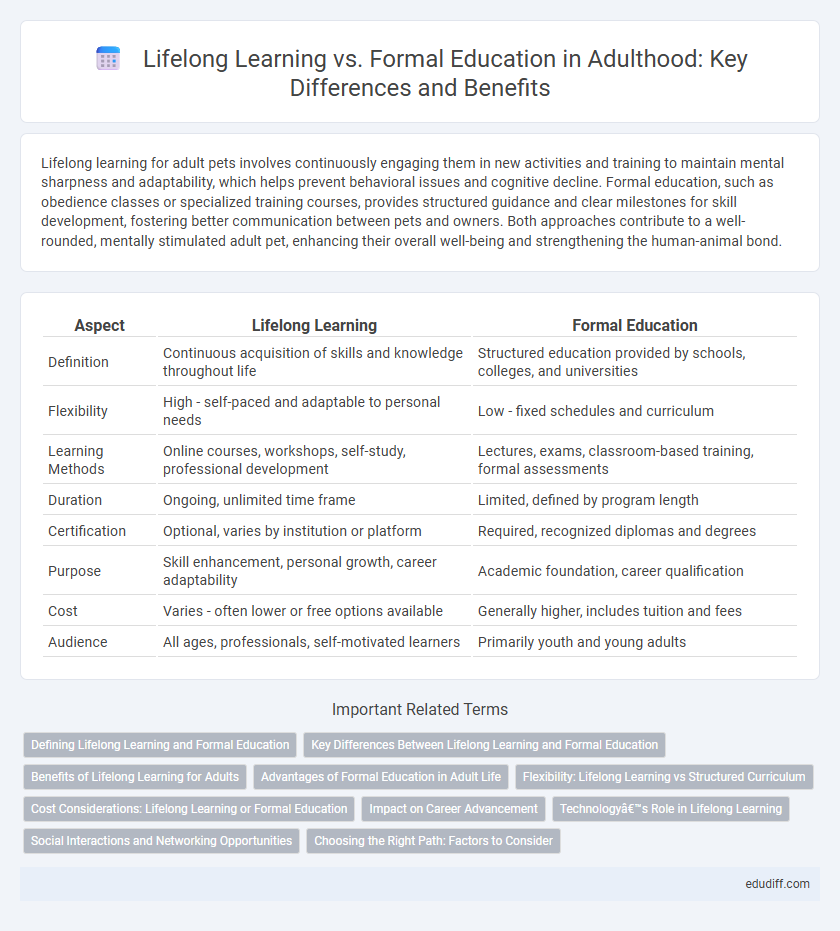Lifelong learning for adult pets involves continuously engaging them in new activities and training to maintain mental sharpness and adaptability, which helps prevent behavioral issues and cognitive decline. Formal education, such as obedience classes or specialized training courses, provides structured guidance and clear milestones for skill development, fostering better communication between pets and owners. Both approaches contribute to a well-rounded, mentally stimulated adult pet, enhancing their overall well-being and strengthening the human-animal bond.
Table of Comparison
| Aspect | Lifelong Learning | Formal Education |
|---|---|---|
| Definition | Continuous acquisition of skills and knowledge throughout life | Structured education provided by schools, colleges, and universities |
| Flexibility | High - self-paced and adaptable to personal needs | Low - fixed schedules and curriculum |
| Learning Methods | Online courses, workshops, self-study, professional development | Lectures, exams, classroom-based training, formal assessments |
| Duration | Ongoing, unlimited time frame | Limited, defined by program length |
| Certification | Optional, varies by institution or platform | Required, recognized diplomas and degrees |
| Purpose | Skill enhancement, personal growth, career adaptability | Academic foundation, career qualification |
| Cost | Varies - often lower or free options available | Generally higher, includes tuition and fees |
| Audience | All ages, professionals, self-motivated learners | Primarily youth and young adults |
Defining Lifelong Learning and Formal Education
Lifelong learning refers to the continuous, self-motivated pursuit of knowledge for personal or professional development beyond traditional schooling. Formal education is a structured system of learning typically delivered in classrooms within institutions, following a predefined curriculum and assessment. Emphasizing adaptability and ongoing skill acquisition, lifelong learning complements formal education by fostering continuous intellectual growth throughout an adult's life.
Key Differences Between Lifelong Learning and Formal Education
Lifelong learning emphasizes continuous, self-directed acquisition of skills and knowledge beyond traditional settings, adapting to personal and professional growth throughout life. Formal education follows structured, curriculum-based instruction within institutions, culminating in certified qualifications. Key differences include the flexibility of lifelong learning versus the standardized assessment and regulated environment of formal education.
Benefits of Lifelong Learning for Adults
Lifelong learning empowers adults to continually update skills and adapt to evolving job markets, enhancing career resilience and personal growth. It fosters critical thinking and creativity beyond traditional classroom settings, promoting mental agility and emotional well-being. This flexible, self-directed approach allows personalized pacing and real-world application, which often leads to higher engagement and sustained motivation compared to formal education.
Advantages of Formal Education in Adult Life
Formal education provides adults with structured learning environments and recognized qualifications that enhance career opportunities and professional credibility. Access to expert instructors and standardized curricula ensures comprehensive knowledge acquisition and skill development. Additionally, formal education fosters networking opportunities with peers and industry professionals, facilitating personal growth and career advancement.
Flexibility: Lifelong Learning vs Structured Curriculum
Lifelong learning offers unparalleled flexibility, allowing adult learners to tailor their education pathways according to personal schedules, interests, and real-time professional demands. Unlike formal education's structured curriculum, which follows a fixed timeline and predetermined course sequence, lifelong learning adapts to evolving knowledge needs and encourages continuous skill development. This adaptability makes lifelong learning particularly effective for adults balancing work, family, and ongoing education goals.
Cost Considerations: Lifelong Learning or Formal Education
Lifelong learning offers cost flexibility with many free or low-cost online resources, reducing financial barriers compared to formal education's often high tuition and fees. Formal education typically requires significant upfront investment for degrees and certifications, which may include hidden costs like textbooks and commuting. Budget-conscious adults prioritize lifelong learning to enhance skills without incurring overwhelming debt or long-term financial commitments.
Impact on Career Advancement
Lifelong learning enhances career advancement by continuously updating skills and adapting to evolving industry demands, leading to greater job security and promotion opportunities. Formal education provides foundational knowledge and recognized credentials essential for entry-level positions and professional credibility. Combining lifelong learning with formal education maximizes career growth potential by blending theoretical understanding with practical, up-to-date expertise.
Technology’s Role in Lifelong Learning
Technology's role in lifelong learning revolutionizes adult education by providing flexible access to online courses, webinars, and interactive platforms that accommodate diverse schedules and learning paces. Digital tools such as AI-driven personalized learning, virtual reality simulations, and mobile apps enhance skill acquisition beyond traditional formal education boundaries. This continuous, tech-enabled learning approach supports ongoing professional development and adaptability in fast-evolving industries.
Social Interactions and Networking Opportunities
Lifelong learning offers diverse social interactions and networking opportunities through informal settings such as workshops, community groups, and online forums, enabling adults to connect with peers across various industries. Formal education provides structured networking opportunities via classrooms, alumni associations, and internships, fostering relationships with educators and students in specific fields. Both approaches enhance social capital, but lifelong learning promotes broader, more flexible connections beyond traditional academic environments.
Choosing the Right Path: Factors to Consider
When choosing between lifelong learning and formal education, adults should consider factors such as career goals, flexibility, and cost. Lifelong learning offers adaptable, self-paced skill development ideal for evolving industries, while formal education provides structured curricula and recognized credentials essential for certain professions. Evaluating personal learning styles, time availability, and immediate application needs helps determine the most effective path for professional growth and personal development.
Lifelong learning vs Formal education Infographic

 edudiff.com
edudiff.com